- Home
- Sonya Hartnett
Thursday's Child Page 3
Thursday's Child Read online
Page 3
‘He’s been down there a fortnight,’ said Mrs Murphy. ‘It isn’t natural and I won’t let anyone say it is. A child needs fresh air and the sun on his head.’
Mam was putting plaits in my hair and I swivelled my eyes to Mrs Murphy. She knew a good deal about children, especially considering she had none of her own.
‘He’ll come out now the distress is over, Rose.’
‘You want to be sure he does, Thora, and soon.’
‘I think that, while he’s content down there, we should let him be.’
I rolled my gaze to Da. He gave me a sharp wink and a sly grin. Mrs Murphy was tisking.
‘Leaving him be is the last thing he wants, Court. The boy’s beggaring for attention.’
‘Then giving it to him will just be encouragement.’
Mrs Murphy gave a cross little bark. ‘He’s not taken well to the arrival of the tot. You saw how he was, sulky, and suspicious.’
‘Tin’s not jealous of Caffy,’ I told her, same as I had told her before.
‘Then why won’t he come out?’
‘Because he likes being under the house.’ Gawd, she was dense. ‘He likes digging –’
‘Harper.’ Mam twitched my hair.
‘I know jealousy when I see it.’ Mrs Murphy set her jaw. ‘I’ll be proved right, time will tell.’
Audrey was waving a hand above Caffy’s pearly face, whisking away the flies. ‘What does he do all day?’ she asked. ‘Only dig?’
Mam was finished and I scuttled from her reach, two skinny plaits sprouting like weeds behind my ears and already unravelling from their bows. ‘He’s not really digging – he’s not digging tunnels. He’s just changing the shape of things.’
‘He eats his dinner under there,’ said Devon, licking the taste from his glass. ‘It’s disgusting.’
‘He’s only been doing that for a few days. He used to poke out his head and arms.’
Mam asked, ‘Will he come if I call him, Harper?’
‘Maybe.’
‘Tin!’
‘You needn’t shout. He can hear.’
‘Tin? Tin, would you like to chew the orange rind?’
We waited, Da and me bent over the veranda railing so we’d be the first to see anything, all of us deadly silent in an effort to hear something, but all we heard was the trees blowing in the quiet, and Tin did not appear. ‘There you are,’ said Mrs Murphy. ‘Green.’
‘You call him, Harper,’ said Da. ‘He might come for you.’
I knew he wouldn’t, and hesitated. ‘He’s not a dog,’ I muttered. ‘He has to have a reason.’
Da smiled. ‘Well, let him be. He’ll think of his bed when the night gets cool and we’ll see him then.’
I bit my nails and must have looked shifty. ‘Harper?’ asked Mam
I slouched and sighed, pushing my kneecaps around. I said, ‘When he thought everyone was asleep last night, he snuck out and went down there again.’
‘And stayed out all night?’
‘Mmm.’
‘Without a blanket?
‘Nnn.’
‘I knew I heard a noise,’ said Devon. ‘I thought it was rats.’
‘Now Thora, he’ll catch a chill –’
‘The dogs care for him,’ I cut in quickly. ‘The dogs go under there and sometimes they help him dig. They would have curled up with him and kept him warm.’
Mam was looking dazed by all this, she was staring ahead at nothing. ‘Harper,’ she murmured, ‘is he filthy?’
‘Oh no, he’s only dirty.’
‘A splash of dirt never hurt a fella.’ Da vaulted the railing and knelt in the grass, craning to see under the house.
‘That depends on the dirt, surely,’ said Mrs Murphy. ‘How is he attending to the needs of his bladder and bowels, is what I would like to know.’
‘Like a cat,’ I told her. ‘He digs, and he buries. He’s dirty, but he’s clean.’
Devon grinned and Da hawed, and even Mam and Audrey and Mrs Murphy smiled. It made me leap about and yelp excitedly. ‘He’s clever, Tin is clever, he’s only five years old and he’s doing this all by himself!’
‘Clever he may be, but no good will come of it. Stop that prancing, child! It’s absurd for him to be hacking away beneath the house. Absurd, Thora! He’ll be mashed like a snail if the house drops on him.’
‘Pass me the light, Devon.’ Da held the lamp under the boards and I saw its yellow beams glowing through the cracks. ‘I can’t see him. I see a dog, but I don’t see him.’
‘You never see him unless he wants you to.’
‘Court,’ said Mam, ‘is the house stable, do you think? I don’t want him hurting himself.’
‘The house will be standing when Tin’s an old man.’
But Mam had been spooked. ‘He never wanted to hide before the young one was born, did he? I don’t think he did.’
Da straightened, and poured himself the dregs of the brandy, and thoughtfully drank it while we leaned forward and waited, holding onto our breath. He said, ‘Tin is not the jealous kind, Thora. It’s not the baby who’s to blame. Tin just likes being under the floor, I reckon. There’s something about the place that pleases him. He’ll grow out of it, and making a fuss in the meantime won’t hasten things. He’s not harming anyone or anything, being where he is.’
I was delighted, for I had been making a daily diversion of Tin’s dusty escapades, but I was tinged with some spiteful greenery, too – I knew that, had it been me beneath the shanty, Da would have drummed me out smartly, and then tanned my hide.
‘It’s your decision,’ said Mrs Murphy, clapping her thick hands on her knees. ‘All I’ll say is, I’m glad he’s yours and not mine. I’ve worries enough without mothering a boy who thinks he’s half rabbit. I’d put a blanket out for him, Thora, if you’re going to let him have his head. Dogs have fleas, and he’ll be drained bloodless before long.’
It was a good thing in the end, Mrs Murphy weaseling into Mam’s head the idea that Tin must be jealous of the baby. Mrs Murphy had intended the qualm should curb Tin somehow, but it didn’t work that way. Rather, keeping Caffy safe and close meant setting Tin free, to do as he pleased. Caffy stopped Mam from stopping Tin even when she saw how far he had gone from us, how distant he was leaving her behind. And when a day came that proved Caffy’s coming and Tin’s going had nothing to do with jealousy but were coincidence and nothing more, it was much too late for Mam, or for me or for Da or for anyone, to change his ways, even if we wanted to.
TIME PASSES SLOWLY WHEN you’re young, and quickens as you get old. Summer lasted forever when I was seven, but now it only visits. When I was seven the days had more hours than I had use for and the distance between sun up and down again was a vast and lazy sprawl; now, when I look back, things seem to have happened with the most hectic and startling speed. The weeks and months have seeped into each other and become a span without feature and detail, riddled with cavernous holes. I remember Caffy with the pink on his cheeks the evening we talked about Tin under the house, but I don’t remember him learning to crawl. In my ragged-edged memory he is, one moment, a babe in Mam’s arms; the next, he is walking and talking. I don’t remember the weeks that followed that evening on the veranda but I remember when I stopped thinking it was strange, to have a brother living beneath the floor. I remember this because I remember seeing Tin standing in the yard with his shadow stretching away from his feet and thinking, What is he doing there?
In summer when the heat was such that you could see it like a ghost or a genie, wavering and writhing without being visible at all, someone was always under the floor with him, hunkered down in the special place he’d gouged and kept brushed smooth for his guests. If Mam or Da was huddled there, there wasn’t room enough left for anyone else, but Devon and I could squeeze in together and Audrey would sometimes bring Caffy, who would fidget and be bored. I liked it best when I was alone there, with space to stretch and put my chin to the cool ground. We used to tell him what was g
oing on above his head although I knew he could hear everything anyway and most of what we said was stale news to him: Da would say, ‘There was a redback in the firewood, you should have heard your Mammy shout,’ and Devon would say, ‘I got another deener, Tin, I found it on the road.’ Mam had fits of worry and would try to drive him out occasionally, threatening him with snakes seeking shelter and tempting him with a corner of the big bed, if sleeping in the big bed was what would mollify. She said he would listen but not hear her, that he was deaf to her wishing. I decided that he heard too much, not being particularly interested anyway, so I used to lie and be silent with him, watching him work and musing on matters of my own. Sometimes I would fall asleep and I never slept so peacefully as I did those summer afternoons, cooled by the earth that was always in shadow, walled off from the sun and the wind, waking to crickets tuning their violins and to the restful searching sound of Tin’s ploughing hands. He crafted the dirt so carefully, piling it this way and that, shoring it up and feathering it away. Underground amongst it you could see how he worked in a halo of light that filtered between the shanty stumps and lit up his skin, which was whitening already, and his eyes, which would consider you brightly before turning to work and away.
One day he was most occupied and didn’t pause to sit and stare at me a while, as was his typical way, so I squirmed as far under the house as my head would let me and spied on what was involving him. He was crouched in the centre of his territory, the place where darkness gathered at its thickest and the halo from outside never shone. I said nothing until my sight sharpened to make out what he was doing and then I gave a squeak of thrill. I had been waiting to see what I finally saw, expecting it every day – it was the logical step for Tin to take. I backed out and ran to tell everyone that Tin had started work on a tunnel. At last he was expanding his empire, having taught his hands the language of the dirt, to understand its quavers and tremorings, to trust its sturdy promises and to read its crumbly mind. Everyone came to contemplate what he’d done but I was the only one small enough to wriggle far enough and see it with my own eyes. The tunnel wasn’t deep yet, being hardly more than a hole, but its walls were precisely circular and you could tell it was solemn and serious. The earth from its innards was scattered about but there wasn’t much of it, hardly more than a powdering; later we would notice that Tin left almost no evidence of his industry behind him and for years I could not understand how that was done. Da was asking what I could see and I shouted a description of the tunnel and when I glanced awkwardly over my shoulder I could see my family on their bellies, captivated and staring.
‘Bring a bowl of water,’ Da told Audrey, and when it came he slid it beneath the house as far as his arms would go. ‘If the walls of your tunnel are damped down and dried out, Tin,’ he said, ‘they might hold together good and strong.’
‘Court,’ Mam murmured, ‘maybe we shouldn’t encourage him …’
But Da was back with his eyes at the gap, not listening, straining to see. Tin was considering the water. After some thought he dipped a hand in it and dabbed his wet fingers to the mouth of the tunnel. ‘He’s using it!’ I shouted, and heard Mam tisk crossly and Da laugh triumphantly. Every day, after that, he made sure there was a bucket of water set down by the veranda. Some days Tin used it and we’d find the empty pail rocking where it had been flung; other days he ignored it for the dogs to lap away. He knew what was best, he knew when and what was needed. Overnight the tunnel became deep enough for him to stand in, and within a week it dog-legged sufficiently to hide him away.
One day Da came to me and he was holding the arched head of a pickaxe, its peeling hide crackling and rusted black and blue. He said, ‘Look at this, Harper. I found it by the mine shaft. Buried to the hilt it was, but the dirt washed off pretty well. It must be fifty years old, this – see how the handle’s decayed?’
I could see, all right, and I felt the weight of it when he put it in my arms. ‘Go and give it to Tin,’ he ordered, and I did as I was told. Tin climbed out of the tunnel and received the pick head warily, for it was as long as his legs and as heavy as himself. He did not touch it while I was looking, and regarded it from the corner of his eye, but Da seemed content. ‘He’ll mull it over and decide whether he has a use for it or not.’
I trailed him through the paddocks where he was doing the rounds of the closest rabbit snares and after a time he said to me, ‘What are you thinking, Harper?’
‘Nothing, Da.’
‘Yes you are. You’re sucking your fingers in your thinking way.’
I pulled my fingers from my mouth and tucked my hands behind me. Da frowned from under the brim of his hat. ‘You’ve been in mischief, have you?’
‘No, Da, I swear!’
His blue eyes kept me prisoner a moment before letting me go; there was a rabbit at his feet and he bent a knee to work at it. This rabbit was a dead one, because sometimes they died of fright. If they weren’t dead already, Da would break their necks by whacking them over his thigh. But this one was as stiff as bark, its body stretched as long as it would go. Da shook it loose of the snare and flipped it back and forth, to check that it was sound.
I blurted, ‘You like Tin being under the floor, don’t you, Da?’
He glanced at me. ‘Why? You thinking about going down there yourself?’
I grinned, squinting against the lash of my hair. It was a hot dry day and blowy and the leaves on the trees were thrashing together furiously. ‘No, Da! It’s just – Mam doesn’t like it, is all I mean.’
‘She doesn’t mind too much.’
‘But she gets mad sometimes, when she talks about him.’
Da carried the rabbit over his shoulder, where it stuck out like a horn, and I scurried in his streaky shadow as we walked on to the next. The grass had died and left bald, red, crack-riddled earth behind it; ants were pouring from the cracks and charging around everywhere, racing over my bare toes. ‘I reckon that’s just natural mother-feeling,’ he said. ‘Children can be taxing.’
‘But you don’t mind about Tin. You gave him the pick, to help him.’
He said nothing and it might have been that he hadn’t heard, what with the wind frothing up the leaves and the stones gritting under his boots. So I said more loudly, ‘You don’t mind Tin digging. I thought it would remind you, maybe.’
‘Remind me of what?’
‘Of the mud.’
Mam always said we weren’t to talk to Da about things like the mud, but she’d never told me why. Now Da stopped walking with a sudden jolt that made me leap backwards, wildly regretting my words. But he simply looked at me, his hands gripping rabbit legs. He said, ‘The mud in the war, you mean?’
I nodded cautiously. ‘… You said it used to break your heart.’
‘It did do that.’
He used the rabbit to swat an insect and went on, and I followed him quietly. He started talking, waving a hand to ward off flying bugs.
‘In the war, the one thing I wanted to do to the very best of my ability was dig. An important man, a general, once told the boys, Dig, dig, dig, until you are safe. We spent most of our time trying to do as that general said: we lived in trenches that we dug and dug over because they were always falling in, and filling up with water, and getting blasted sky-high. I was forever digging, but I never could do it the way I wanted. I could point a rifle and jump a wire and I was handy at doing those things, I knew I could do them well, but I could swing a shovel and do it all day if I had to, and never be pleased with my work. I could never dig deep enough, nor careful enough, nor quick as I wanted. I could never dig until I was safe, as that general had told me to do.’
I stared up at him, and he down at me. We had come to the next snare and there was a live rabbit caught by the toes and it was leaping up and being yanked down, landing with a thump and a gritty plume. ‘Tin could have done it, though,’ Da said. ‘Tin could have dug for the whole battalion. Tin’s got a talent. He has a gift.’
‘Is Tin digging t
o get safe?’
‘I reckon he must be.’
‘But why? There’s no war now. What does he need to be safe from?’
Da looked at the rabbit, which was pitching itself in circles in a cloud of dirt and fur. ‘Maybe you don’t need to be safe from something, Harper. Maybe you can just be safe – I don’t know. I only know that, in the war, I couldn’t dig to save myself, and I wasn’t safe because of it. Maybe Tin is digging because every skerrick in him is demanding that he do it, and that’s what will keep him safe. He’s doing just as that general told us to do, as if he heard it for himself. So I won’t hinder him, if digging is what he wants, and I won’t let anyone else hinder him, either.’
By the time Tin had been under the floor for a year everyone for miles around had heard about his subterranean dwelling and in the early days some of those at school had to be menaced for making mockery and only afterwards learned to respect it, but most were admiring from the start. All of them came visiting, at one time or another, to have a squizz for themselves, but there was little to see. The adult neighbours couldn’t squeeze beneath the house far enough to inspect the tunnel, and the children they sent under could only come out agreeing that what we said was true – there was a tunnel, all right, but it arched away so steep and swarthily that they couldn’t see Tin or anything. Da made a law that none should go into the tunnel because that was Tin’s domain, and everyone thought this an excellent rule. It was not an inviting prospect, descending into that blackness. When the schoolteacher came yammering about Tin being or not being educated, Da bent the rule a curve. He said that, if the teacher could catch him, he was at liberty to fill Tin’s skull with whatever learning he cared. The teacher glanced beneath the house and shiveringly confessed to being queasy of small spaces, and went away alone.

 Butterfly
Butterfly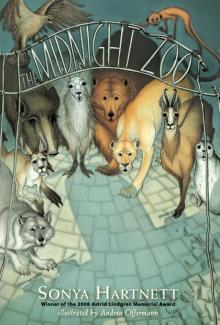 The Midnight Zoo
The Midnight Zoo Stripes of the Sidestep Wolf
Stripes of the Sidestep Wolf The Best Australian Stories 2012
The Best Australian Stories 2012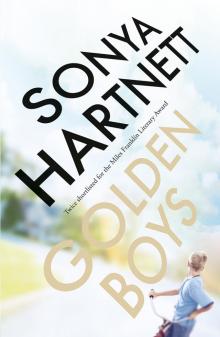 Golden Boys
Golden Boys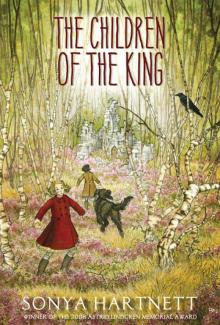 The Children of the King
The Children of the King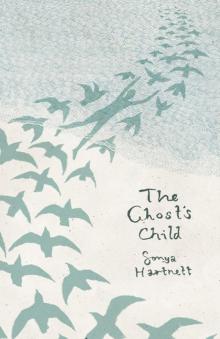 The Ghost's Child
The Ghost's Child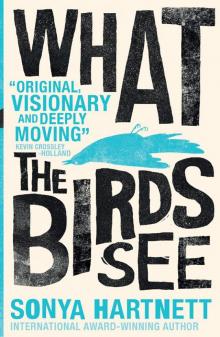 What the Birds See
What the Birds See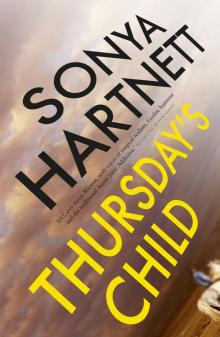 Thursday's Child
Thursday's Child